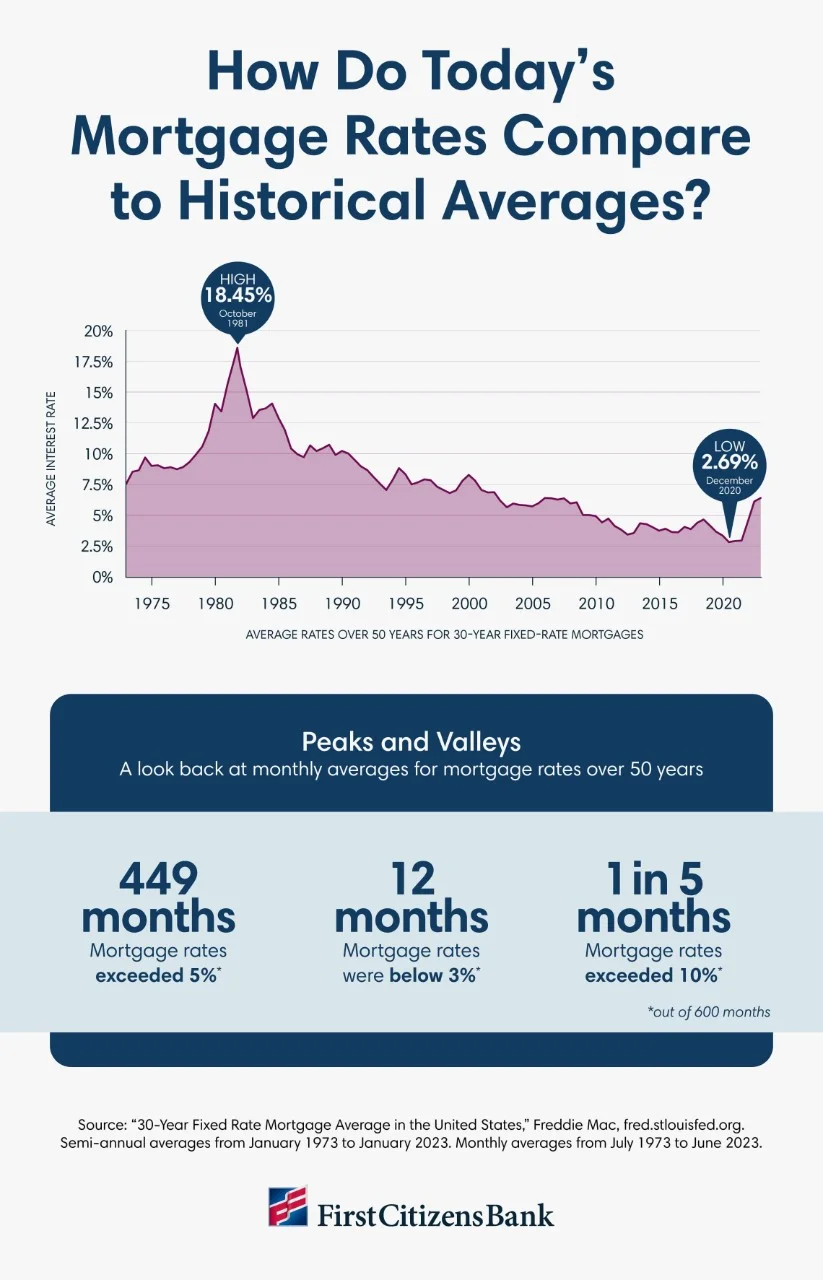How to shop for a mortgage
When it comes to buying a home, if you're not paying cash—and most of us aren't—you might need to shop for a mortgage. However, finding the right lender, navigating various types of home loans and making sense of mortgage terminology may often feel confusing, particularly if you're a first-time homebuyer.

From types of mortgage loans to what to look for when comparing mortgage lenders, this guide touches on what you may need to know before shopping for a mortgage.
Comparing types of home loans
The first step in your selection process is understanding the different types of mortgage loans. Every homebuyer has a unique financial and personal situation, and the mortgage you choose should be a good fit for your budget and long-term financial goals.
Most lenders offer many different types of mortgages. While they may use different names for their home loans, the underlying components should be comparable.
As you explore your options, you may likely come across conventional and conforming loans.
Use the glossary of mortgage terms
As you make your way through this guide, you may find it helpful to reference our glossary of mortgage terminology.
What is a conventional mortgage?
Most mortgages are conventional mortgages, or loans made through a private lender and not part of any specialized government program. To qualify for a conventional mortgage, a cash payment equal to a specified percentage of the purchase price is required. The size of the down payment depends on an individual's credit score. Those with okay scores need a 20% down payment.
Check out our down payment guide
Learn more in our guide to down payments.
Conforming versus nonconforming mortgages
Conventional mortgages are also conforming mortgages, or home loans that adhere to Fannie Mae and Freddie Mac guidelines. Because the borrower meets certain minimum credit requirements and the loan amount is under a specific threshold, private lenders may sell the loans to government-sponsored enterprises.
Nonconforming mortgages are home loans that don't adhere to the guidelines established by Fannie Mae and Freddie Mac. By definition, jumbo mortgages are nonconforming as they exceed maximum loan limits. You may find the current limits at FannieMae.com.
Government mortgage programs
Several other types of nonconforming loans are available that help homebuyers in specific situations. At a high level, these loans are issued by a bank or other lender but are backed by the federal government. Because the government is covering potential defaults, lenders are taking on less risk, and that means they may make it easier for borrowers who meet certain criteria to qualify for a mortgage.
Types of government-backed mortgages include:
FHA loans
Federal Housing Administration, or FHA, loans may help buyers with lower credit scores and lower down payments purchase a primary residence. Learn more in our guide to FHA loans.
VA loans
Veterans Affairs, or VA, loans allow active service members and veterans to purchase a primary residence with little or no money down and without a mortgage insurance requirement. Typically, these loans offer lower interest rates and limited closing costs, saving borrowers thousands of dollars over the life of the loan.
USDA loans
The United States Department of Agriculture, or USDA, backs loans that make purchasing a primary residence more affordable for low- to moderate-income borrowers in eligible rural areas. USDA home loans don't require a down payment, but they do require mortgage insurance.
We're approved for all government loans
See how to qualify for these popular loan programs. First Citizens is not affiliated with any particular government program.
Fixed-rate versus variable-rate mortgages
While mortgage rates fluctuate based on current market or economic conditions, your level of creditworthiness may determine the specific rate of interest you receive. Depending on the type of loan you choose, you may have some upfront options that also affect what you might pay, starting with your rate structure.
When it comes to rate structure, you may have a choice between fixed-rate and variable-rate loans. Next, consider lowering, or raising, your interest rate by purchasing discount points or lender credits. Let's take a closer look at these options.
Fixed-rate mortgages
A fixed-rate mortgage keeps the same interest rate over the life of the loan. Homebuyers often choose fixed mortgages for their stable payments, simplicity and ease of fitting into a budget. If a home is purchased during a period of low interest rates, a fixed-rate mortgage protects against rising rates in the future.

Adjustable-rate mortgages
Adjustable-rate mortgages, or ARMs, typically offer a lower rate for an introductory period, then reset according to an underlying base rate. Common types of ARMs include 3/1 ARMs, 5/1 ARMs and 7/1 ARMs.
For example, a 5/1 ARM has a fixed monthly payment and interest for the first 5 years, then turns into a traditional adjustable-rate loan for the remaining 25 years. It's important to note that these two numbers don't indicate how long your full-loan term might be. Most ARMs are 30-year mortgages, but buyers may choose a shorter term.
Buyers planning to sell their homes may want to consider an adjustable-rate mortgage to take advantage of the lower introductory rate. An ARM may also be advantageous if you expect interest rates to decline over the initial period. But it's always wise to seek the advice of a financial professional when it comes to planning for what may or may not happen at some point in the future.
Discount points and lender credits
As you shop for a mortgage, you may come across two options that impact your interest rate: discount points and lender credits.
Prepaying interest by purchasing points is one strategy that may help lower your interest rate. The price of a single point is equal to one percent of your mortgage loan. For example, on a $100,000 loan, one point would equal $1,000.
How much less you pay in interest for each point, or fraction of a point, you buy may vary, but it's important to understand that points may help lower your interest rate compared to the rate you would pay for a similar loan without points at the same lender. Offers are unique to each lender, and some may be more or less attractive than others.
Lender credits are also figured as a percentage of the mortgage loan, but in this case, it's a reverse calculation. In exchange for raising your interest rate by a set amount, the lender agrees to roll a portion of the closing costs—common fees paid to process your loan—into the loan amount.
Credits may be useful for people who lack enough upfront cash to pay closing costs. But you may want to consider this decision carefully, as paying a higher rate of interest over the life of your loan may be an expensive solution.
Our mortgage comparison calculator helps to show you how much more or less you may pay, depending on whether you purchase credits or points.
Choosing your mortgage term
When you compare borrowing options for your specific needs, make sure to consider the mortgage term, which is the amount of time you have to pay the loan off. The most common term for mortgage loans is 30 years, although many lenders also offer shorter terms—such as 15 or 20 years.
While a longer term may give you a lower monthly payment, you typically pay more interest over the life of the loan. A shorter term may carry a higher monthly payment, but you typically pay off your home faster, possibly saving money on interest over the life of your loan.
When choosing between a 15- or 30-year mortgage, it's important to carefully examine your budget. If you'd prefer to save on interest, but a 30-year mortgage works better for your current budget, know that refinancing to a shorter-term mortgage could be an option later.
The process of shopping for a mortgage
Once you've determined the loan type, rate structure and term you're interested in, you may request a loan estimate from several lenders. For comparison purposes, it's also a good idea to ask for estimates based on a similar down payment.
While every lender may have their own set of criteria, as a general rule, you should be prepared to provide the following information:
- Your income
- Your Social Security number
- An address for the home you want to purchase
- An estimate of the home's value
- The loan amount you want to borrow
The Consumer Financial Protection Bureau, or CFPB, recommends getting estimates from at least three lenders. Just don't let too much time lapse between estimates. Credit checks from multiple mortgage lenders may appear as a single inquiry on your credit report as long as they're requested within the same 45-day window.
What to look for when comparing mortgage lenders
When you're evaluating lender estimates, start by comparing interest rates. Pay particular attention to when the loan estimates were issued, as market rates may change daily.
The best rates, or prime rates, are often offered to those with higher credit scores. Of course, taking steps to prepare your finances before applying for a mortgage may help you obtain a better rate. But if you're offered a rate above prime, it may not hurt to ask if there's anything to do now to qualify for a lower one.
It's helpful to work with an experienced lender who offers personalized guidance while walking you through the process. Borrowing from a traditional bank versus an online mortgage broker may also be beneficial, as traditional banks are less likely to sell your mortgage to another company for servicing. Depending on your needs, a traditional bank may offer other benefits, too, such as the ability to consolidate your banking needs and access ongoing support.
Once you've selected a lender, you're ready to undergo a formal loan review. This is when a lender performs a risk analysis on your application, taking a deeper dive into your creditworthiness and the property's value.





